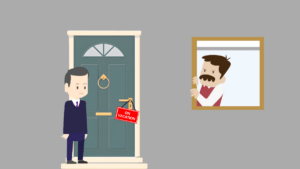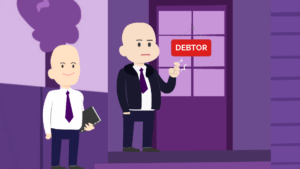Can a Bailiff Take My Car For a Parking Fine?
Failing to pay a parking fine can have serious consequences. If you’re subject to court-ordered payment, bailiffs may take extreme measures such as seizing your vehicle – though they’ll likely look for other assets before taking that step. To avoid this scenario and keep wheels on the road, make sure any fines are promptly paid up.
Find out what happens when a bailiff comes knocking for an unpaid parking fine! Learn how to avoid having your vehicle repossessed and explore related questions about dealing with debt collectors. Dive in now to discover the answer you’ve been seeking.
Do You Have to Pay?
Parking tickets may not always be enforceable. Depending on the situation, a motorist could dodge their parking fine and evade fines for illegally parked vehicles.
What Happens If You Don’t Pay a Parking Fine?
Being hit with a parking fine can be an expensive and daunting experience. Depending on the circumstances, whether your penalty came from the local authority or a private car park operator, failing to pay could have vastly different ramifications. So it’s essential to know precisely what you’re up against before making any decisions.
Missing a council parking fine? Be ready: if you don’t cough up your dues within 28 days, the authorities could increase it by 50%. They’ll let you know through an official notice called a charge certificate. Delay any longer than 14 days and they can take legal action – which means the judge will be involved!
Ignoring a private parking ticket can have further repercussions. If the car park operator fails to take legal action, you won’t be compelled to pay it – but if they do decide to pursue it in court, then a County Court Judgment may well result in saying that payment is mandatory. Even attending court and defending yourself carries no guarantees; even with preparation for your case, there’s still a potential of incurring costs later down the line.
Can The Council or Car Park Operator Use Bailiffs?
If your debt remains unpaid, the council or car park company can take further action to enforce it. This could include obtaining a court order and using bailiffs in extreme cases.
Ignoring a court order to pay for a parking ticket can put you at risk of more drastic enforcement measures. Local authorities and private firms have several tools in their arsenal, from wage garnishments to asset seizures, that they may use if the debt is left unpaid.
- A Charging Order on a property you own
- An Attachment of Earnings Order
- Enforcement officers to collect the money
What Happens When Bailiffs Are Called?
The council or private company will ensure justice is served by employing trustworthy bailiffs to collect outstanding debt. The debtor will receive a written warning that provides seven days’ notice before the enforcement officers arrive at their property, thereby giving ample opportunity for them to take action and fulfil their legal obligations.
The bailiff company will include a fee with this letter that gets added to your debt – don’t let it get to the point of them having to take further action. Make sure you clear the debt before they visit as there are much more costly penalties associated with their home visits and possession removal!
Creditors may not always be willing to negotiate – if your debt is outstanding and you’re unable or unwilling to pay, they have the authority to liquidate any of your assets in order to recoup what’s owed. However, depending on the situation it might still be possible for an agreement regarding a payment plan.
Can a Bailiff Force Entry For a Parking Fine?
For the most part, bailiffs are not allowed to take forceful entry into your home. However, if you have defaulted on a Controlled Goods Agreement then they can employ various tactics such as using locksmiths or other means of accessing locked entrances and windows. As with any legal matter, it is important to be aware of what rights and responsibilities apply when dealing with bailiffs in order to guarantee that all laws are upheld during their duties at your property.
To avoid direct interaction, communicating with bailiffs is best done from the safety of a second-story window; doors should remain closed.
What if Bailiff Try to Take My Car?
If bailiffs try to take your car, it’s essential to know your rights and options. Here’s what you should do:
- Check Ownership | If the car doesn’t belong to you or is financed, show proof to the bailiffs. They cannot seize a vehicle that isn’t fully owned by you.
- Protected Vehicles | Certain vehicles are protected by law, such as those essential for your work (e.g., tools of the trade) and worth less than £1,350. Inform the bailiffs if your vehicle falls into this category.
- Negotiate Payment | Try to negotiate a payment plan with the bailiffs to avoid them taking your car. They may accept a payment arrangement if it’s reasonable.
- Seek Legal Advice | If you’re unsure of your rights or if the situation escalates, seek legal advice immediately. Understanding your options can help prevent the loss of your vehicle.
- Contact the Creditor | Sometimes, negotiating directly with the creditor who sent the bailiffs can help you come to an agreement and stop the seizure of your car.
If you’re facing bailiff action, it’s important to act quickly and be aware of your rights to protect your assets.
Can Bailiffs Take My Car If It’s Not in My Name?
If a vehicle is owned by someone other than the debtor, such as on Hire Purchase Agreement or jointly with another person, bailiffs are unable to take it. However, if there’s joint ownership of the car then seizure can occur – but the co-owner may be able to make a claim for a portion of any sale proceeds applied towards repaying debt.
If you’re expecting a bailiff to take your car, be aware that there are exceptions which could make this difficult. Knowing these can help ensure the protection of your property and prevent any potential missteps.
When Can a Bailiff Not Take My Car?
Bailiffs have no authority over vehicles, so don’t let the fear of losing your car keep you from making any necessary payments.
- Transform your vehicle into a cosy, mobile home and hit the road for adventure! With an RV or campervan, you can take control of where to lay down your head – from mountain camping to beachside bliss.
- With a Blue Badge, those with limited mobility can enjoy greater freedom and independence to explore the world around them.
- Whether you’re a professional or just starting out, this budget-friendly solution offers all the quality and performance needed to get work done quickly.
How to Stop Bailiffs From Taking Your Car?
Bailiffs may try to take your vehicle, but you can protect it! You’ll need to prevent them from accessing a driveway or public road. Lock up any garages and other property with vehicles inside–this should give the bailiff pause. Additionally, if they do arrive on the scene, there are further steps available for keeping your car safe; act swiftly and assertively in this situation for best results.
- Ensure your vehicle is always secure in a locked garage to protect it from any potential harm.
- Ask a friend or family member to leave it on their property
A Notice of Enforcement is a powerful reminder that your debt won’t simply disappear. If it’s not addressed within seven days, expect visitors to ensure payment is taken care of – so be sure you’re ready.
Will a Bailiff Take My Car For a Parking Fine?
Bailiffs possess the ability to levy a car as payment for an unpaid parking fine, yet there are economic reasons that they might not choose this option. Paying the initial fines and fees is typically more cost-effective than having your vehicle repossessed; saving you from expensive legal headaches while protecting your valuable assets.
Debt collectors may attempt to reclaim their dues by repossessing electrical items, such as TVs and laptops. However, this is far from a given; they could even go so far as clamping down on your car in an effort to force payment.
Can Bailiffs Take My Car Without Warning?
Are you aware of your rights when it comes to bailiffs seizing your car? It’s a question that many people find themselves asking when faced with debt or financial difficulties. In this article, we will delve into the subject and explore whether bailiffs can actually seize your car without giving you prior warning. Bailiffs, also known as enforcement agents, have the authority to recover money owed to creditors by seizing and selling your possessions. However, they are required to follow strict guidelines and procedures. Generally, bailiffs must provide notice of their intention to visit your property and allow you the opportunity to pay the debt in full or arrange a payment plan. When it comes to seizing vehicles, bailiffs cannot take your car without prior warning. They must first obtain a warrant from the court and provide you with notice of their intentions. It’s important to understand your rights and know what to do if you find yourself in this situation. Join us as we delve deeper into the world of bailiffs and explore the rules and regulations surrounding the seizure of vehicles.
How Long Can a Bailiff Clamp My Car For?
Are you wondering about how the length of time a bailiff is legally allowed to hold your vehicle for? In this post we’ll give you the most important information to be aware of. The prospect of having your vehicle locked can be an overwhelming scenario, but knowing the rights you have can ease anxiety. If a bailiff is able to clamp your car, they generally will do it as a part of enforcing debts or a the court’s order. But, they are not able to keep your car clamped for a long period of time. The time period they are able to keep your car in a clamp varies based on situation and the particular laws within your state. When determining the length of time the bailiff is able to lock your car various factors are in playing, such as the kind of debt, the worth of the debt and the particular circumstances surrounding the case. It is essential to be familiar with your rights as well as the restrictions imposed by law on clamping on cars to ensure that you’re not getting treated unfairly. In this piece we’ll look at the common times for clamping your car as well as discuss pertinent legislation as well as provide some advice regarding how you can handle when your vehicle is being clamped. Keep an eye out for more information about your rights and the many days a bailiff is legally allowed to maintain your vehicle clamped.
Can a debt collector take my car?
A debt collector has no legal authority to seize your car or any of your assets. However, a private car park operator may engage the services of a collection agency if you fail to pay an outstanding parking fine. This association is simply one that benefits both parties and does not extend so far as handing over power from the former to the latter – they remain distinct entities with different sets of laws ruling their respective fates.





